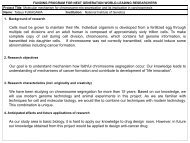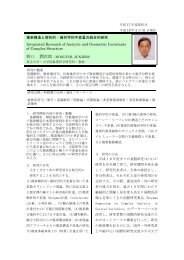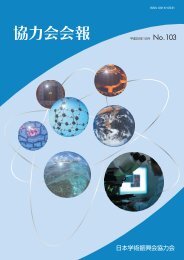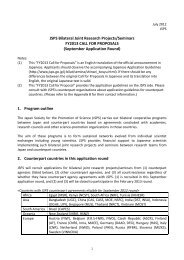"JSPS External Review Report" was issued.(PDF File 1.22MB)
"JSPS External Review Report" was issued.(PDF File 1.22MB)
"JSPS External Review Report" was issued.(PDF File 1.22MB)
Create successful ePaper yourself
Turn your PDF publications into a flip-book with our unique Google optimized e-Paper software.
Overseas experience for young researchersProviding opportunities for young researchers to accumulate overseas research experience is avery effective means of advancing research. In Sweden, which has a relatively small research community,it is normal for young scientists to go abroad to do research. In the US and Japan, there hasnot necessarily been over recent years a strong inclination for young researchers to go abroad.Given this situation, it will be desirable to create a clear-cut career path structure as well as establishinga reintegration fellowship system that guarantees the status of returning researchers for agiven period until they can secure employment at a university or research institute.(2) Fostering Japanese ResearchersProgram to Support 10,000 PostdoctoralsHaving placed high priority on the fostering of young researchers in its first Science andTechnology Basic Plan launched in 1996, the government established the Program to Support10,000 Postdoctorals. That the numerical goal of this program has been met one year earlier thanplanned is highly praised.Having supported approximately half of these doctoral candidates, <strong>JSPS</strong> has played a very significantrole within this program to foster young Japanese researchers. In recent years, <strong>JSPS</strong> has alsotaken over programs from the Japan Science and Technology Corporation (JST) to support youngresearchers working in Japan’s national laboratories and public research corporations. Thisincreased further the weight of <strong>JSPS</strong>’s responsibility in fostering young researchers.Support for graduate studentsIn Japan, the number of graduate students tends to be increasing, but the ratio of graduate toundergraduate students is still low compared to the US and Europe. This ratio will need to beincreased. As measures to accomplish this, the DC program of <strong>JSPS</strong>’s Research Fellowships forYoung Scientists will need to be expanded as will Japan’s research assistant and teaching assistantprograms. Mechanisms should also be considered for reducing the enrollment and tuition fees ofPh.D. candidates or exempting them from such fee payment. However, as not all graduate studentswill go on to become researchers, support for fostering young researchers should be administeredselectively.Support in an era of low birthrate and rapid agingJapanese society is aging while its birthrate declines. This creates a need to make effective useof all the nation’s human resources. To cope with the low birthrate, a system must be considered formaking effective use of the abilities of both sexes (as noted above under “Gender”). At the sametime, rapid advances in Science and Technology research necessitate measures to allow relativelyolder researchers to reorient themselves to new fields so that they can continue to work as active scientists.To this end, positive consideration should also be given, from a viewpoint of researcherdevelopment, to implementing a program that will enable older researchers to acquire new specializations.38







